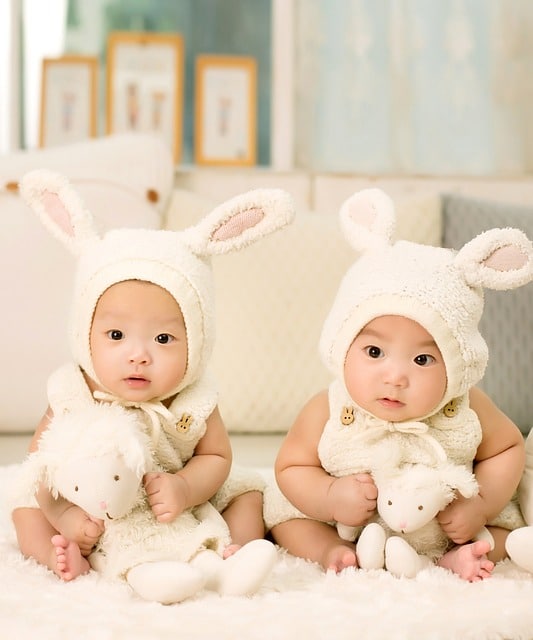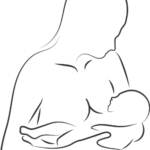Image credit to Tiny Tofo
What Are the Chances of Having Twins There are a couple of common questions that sonographers anticipate from most parents during their initial ultrasound: can you see a heartbeat, and how many are there?
Although having twins might be considered rare, discovering that you’re carrying twins or more can indeed be a large adjustment for any family, that is what keeps so many parents on their toes, wanting to know what is happening in the womb as soon as possible.
So, what are the chances that you’ll have twins, and is there anything you can do to tip those odds a bit? Experts share what you really need to know about getting pregnant with twins.
How Common Are Twin Pregnancies?
It’s possible you know one or two sets of twins in your own life, but only about 3% of live births in the United States result in twins. And of all multiple births, twins—as opposed to other sets like triplets or quadruplets—accommodate 97%. This means producing twins is uncommon but certainly possible.
Different Types of Twins
Though there are different kinds of twins, the basic dualism is between fraternal and identical. Among these, fraternal twins come to be radically more common; they account for 70% of all twin pregnancies.
Fraternal twins
Fraternal twins develop from two individual eggs that have been fertilized by two individual sperm. “In fraternal twins, you can have a boy and a girl, and because they are not genetically identical, these twins won’t necessarily look alike,” explains Carolina Bibbo, MD, director of the Comprehensive Centre for Multiples at Brigham and Women’s Hospital.
Identical twins
Identical twins occur when one fertilized egg breaks into two embryos. They “will share the same genetic information and will be either boys or girls because they come from the same embryo,” says Dr. Bibbo.
Signs of a Twin Pregnancy
Some signs of carrying twins in early pregnancy may include:
A baby bump measuring bigger than expected for the gestational age
Gaining pregnancy weight quickly
Fetal movement that’s felt early and in more than one location
Having more than the expected levels of human chorionic gonadotropin hormone, the pregnancy hormone
More pronounced pregnancy symptoms, including breast tenderness, morning sickness, and fatigue
Also Read : Is It Possible to Have Identical Triplets?
What Boosts Your Chances of Having Twins?
Contrary to movie scientific screenplays, there is not much you can do to influence the twin-making process. However, while the reason for identical twins is largely still a mystery, some factors have been known to increase the likelihood of fraternal twins.
Fertility treatments. There’s a greater possibility of twins after using ovulation-inducing infertility medications, such as those taken during in vitro fertilization (IVF). Almost one in every three U.S. twin babies was conceived after their parents used fertility treatments.
Age. Those over 35 are more likely to conceive twins. “For pregnancies conceived without fertility assistance or medications, the chance of having fraternal—non-identical—twins is higher in older women because there’s an increased opportunity for more than one egg to be released during ovulation compared to younger women,” says Robin Kalish, MD, FACOG, director of clinical maternal-fetal medicine at NewYork-Presbyterian/Weill Cornell Medicine.
Family history: A family history of fraternal twins on the mother’s side increases the chances slightly of a woman carrying twins.
Personal history: In case you have borne twins earlier in your previous pregnancy, the chances of conceiving twins are more likely to occur.
Race: The bearing of twins is more prevalent with Blacks, where statistics indicate they have higher rates of twin births than any other ethnicity or race in the U.S.
Genetic factors: Some genetic factors are involved, including some biological phenomenon of hyperovulation whereby more than one egg is released during the menstrual cycle. “So two eggs can be released in one menstrual cycle that then gets fertilized by two separate sperm, resulting in fraternal twins,” says Dr. Kalish.
How do fertility treatments increase your chances of having twins?
The chance of having twins is significantly increased when one conceives through assisted conception using fertility treatments. “Fertility medications can overstimulate the ovaries, leading to more than one egg being released in a given month,” says Dr. Kalish. “If undergoing IVF, placing more than one embryo in the uterus increases the chance of having twins.”
Not all infertility treatments raise your chances of having twins, but most do. Here are some of the treatments that may lead to twins.
Clomiphene, also known as Clomid
Letrozole, also known as Femera
Gonadotropins (also known as injectables), like Gonal-F and Follistim
IUI treatment, when used along with fertility drugs
IVF treatment
Chances of having twins with clomid
Clomid is an oral medication that induces ovulation and can result in twin pregnancies between 5% and 12% of the time. That means less than one in 10 pregnancies. Your chances of conceiving triplets (or more) on Clomid is even lower: less than 1 percent. This means less than one in 100 pregnancies.
If you are hoping to take Clomid for twins, you should note that there is no guarantee. Twins are considered one of the possible risks of taking this drug—not the goal. In fact, most reproductive endocrinologists try to avoid pregnancies with multiples due to associated risks.
Also, most twins conceived with Clomid will not be identical. During clinical trials looking at twin pregnancies, one in five were identical twins and 80% of the twin pregnancies were fraternal twins (not identical). Clomid increases your odds of conceiving twins because your ovaries may ovulate more than one egg. Identical twins come from one egg— not two.
Myths About Twin Pregnancies
You may have heard that bed rest is encouraged for women carrying twins. However, it isn’t recommended for an uncomplicated twin gestation. “Bed rest can actually increase the risk of blood clots. It can also worsen the physical condition for pregnant women with significant muscle mass loss which will make it difficult to later care for two babies. Furthermore, prolonged bed rest could lead to depression,” says Dr. Bibbo.
Other myths not to pay much attention to include theories that some sexual positions increase your chances of having twins, and that twins will always be born via Cesarean section. Neither is true, says Dr. Kalish.
Risks of Twin Pregnancies
While expecting twins can be exciting, they carry higher risks than single-fetus pregnancies. “As a result of these high-risk concerns, twins need more monitoring throughout the pregnancy,” says Dr. Kalish.
Dr. Bibbo agrees and says no one should be “trying to have twins” because of the increased risk of the following complications:
Preterm labor or delivery
Babies born with low birth weight
Hypertensive disorders
Gestational diabetes
Anemia
Fetal growth restriction
Congenital anomalies
Placenta issues
Twin-to-twin transfusion syndrome: This is an extremely rare condition, one in which the placenta offers these twins unequal shares of its blood, thus they grow at different rates.
While these sound like alarming risks, twins are normally watched quite closely during pregnancy. Women carrying more than one baby usually have prenatal visits more often. It’s essential to find a medical team that you feel comfortable with and will support you with the whole pregnancy, especially when carrying multiples.
What About Triplets, Quadruples, and More?
Any couple trying to conceive has much lower chances of higher-order multiples than twins or singleton births. Without the use of fertility treatments, the chances of conceiving triplets spontaneously are around 1 in 1,800. Quadruplets estimate the odds at around 1 in 729,000.
The risk of a higher-order pregnancy increases with fertility treatments. It’s estimated that just over three-quarters of triplets and higher-order multiples are the result of fertility treatments.
Key Takeaways
While there are certain factors that could increase the chance of having twins, it’s never a sure thing. If it is determined that you are having more than one baby, you will be followed very closely throughout your pregnancy to ensure the best outcome for both you and your babies.










